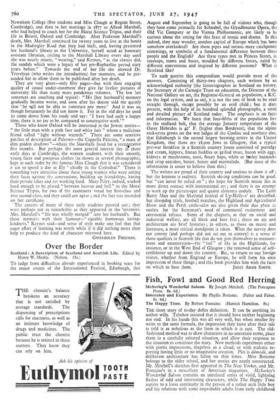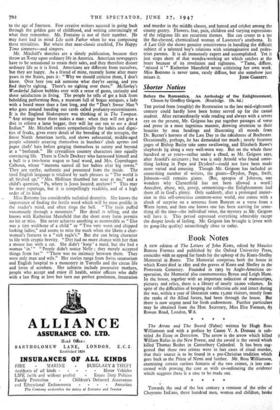Fish, Fowl and Good Red Herring
The Happy Time. By Robert Fontaine. (Hamish Hamilton. 8s.)
THE short story of to-day defies definition. It can be anything its author wills. Tchehov insisted that it should have neither beginning nor end. In his hands this was all very well, but when smaller fry write to the same formula, the impression they leave after their tale is told is as nebulous as the form in which it is cast. The old- fashioned method was to draw characters in no uncertain terms, place them in a carefully selected situation, and allow their response to the situation to constitute the story. New methods experiment either with poetic impressions, shapeless as a cloud, or with realistic re- porting having little or no imaginative creation. Plot is demode, and deliberate architecture has fallen on thin times. Miss Bottome belongs to the older school, and her stories are neatly constructed. Mr. Mitchell's sketches first appeared in The New Yorker, and Mr. Fontaine's in a miscellany of American magazines. McSorley's Wonderful Saloon contains an unrelated series of vivid, lightning flashes of odd and interesting characters, while The Happy Time aspires to a loose continuity in the person of a rather arch little boy and his relations with some improbable adults from early childhood
to the age of fourteen. Few creative _writers succeed in going back through the golden gate of childhood, and writing convincingly of what they remember. Mr. Fontaine is not of their number. He may have had in mind Life with Father when he was composing these trivialities. But where that near-classic crackled, The Happy Time simmers—and simpers. .
Mr. Mitchell's sketches are a timely publication, because they throw an X-ray upon ordinary life in America. American newspapers have to be sensational to retain their sales, and they therefore distort ordinary life as it is lived. Americans are different from ourselves, but they are happy. As a friend of mine recently home after many years in the States, puts it : ," Why we should criticise them, I don't know. Over here you ask someone what they're saying, and you find they're sighing. There's no sighing over there." McSorley's Wonderful Saloon bubbles over with a sense of gusto, curiosity and sheer satisfaction in living. The people he tells of get a kick from beholding performing fleas, a museum full of bogus antiques, a lady with a beard more than a foot long, and the "Don't, Swear Man who goes around handing out cards called profanity-exterminators. It is the England Shakespeare was thinking of in The Tempest. "Any strange beast there makes a man : when they will not give a doit to relieve a lame beggar, they will lay out ten to see a dead Indian." Mr. Mitchell relates sympathetically the habits and digni- ties of freaks, gives every detail of the breeding of the terrapin, the finest North American turtle, and shows substantial, middle-aged people solemnly arraying themselves in butchers' cloth aprons and paper chefs' hats before gorging themselves to satiety and beyond at a "beefsteak." He crystallises country characters into equally convincing life. There is Uncle Dockery who harnessed himself and a bull to a two-horse wagon to haul wood, and Mrs. Copenhagen Calhoun, whose "mamma named all her babies after big towns." They are earthy, authentic and presented from the inside. The tired English language is vitalised by such phrases as "The world is all bitched up," "'Mrs. Hollinan thumbed her nose at me," and a child's question, "Pa, where is Jesus located, anyhow?" This may be mere reportage, but it is compellingly readable, and of a high order of its kind.
Miss Bottome has considerable technical dexterity. She knows the importance of finding the fertile word which will be most prolific in the reader's mind, and often rings the bell. "The train puffed venomously through a mountain." Her detail is telling, and she knows with Katherine Mansfield that the short story form permits no hit or miss. She never achieves anything as memorable as "Else was a tiny wishbone of a child" or "Two very worn and chipped looking ladies," and seems to miss the mark when she likens a char- woman's features to a "sick eagle's." But she can bring character to life with cryptic brevity. "Dirt had no more chance with her than a mouse has with a cat. She didn't ' keep ' a maid, but she had a woman in.' " "People didn't notice Nelly ; they merely accepted things from her." "There was no intimacy between them. They were only man and wife." Her stories range from Swiss sanatorium and English hospital to a monastery in Torcello and the circus life and loves of acrobats. Her subjects include possessive mothers, people who accept and enjoy ill health, senior officers who daily with a last fling at love but turn out perfect gentlemen, frustration
and murder in the middle classes, and hatred_ and cricket among the county gentry. Flowers, fear, pain, children and varying expressions of the religious life are recurrent themes. She can create to a tee the flat-chested, chemicalised woman of Lawrence's anathema. In A Last Gift she shows genuine sensitiveness in handling the difficult subject of a talented boy's relations with unimaginative and pedes- trian parents. It is all immensely expert and accomplished. Yet it just stops short of that wondec-working art which catches at the heart because of its revelation and rightness. "Tame, diffuse, 'missed it ' " Katherine Mansfield wrote criticising her own work. Miss Bottome is never tame, rarely diffuse, but she somehow just



































 Previous page
Previous page